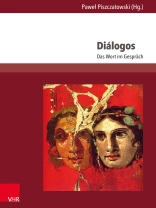Seit der Antike ist der Dialog eine literarische Grundausdrucksform im Bereich des Theaters und als Medium philosophischer Reflexion. Michail Bachtin verwendete die Kategorie der Dialogizität als Schlüssel zum Verständnis europäischer Romantradition und Lyriker wie Paul Celan machten sie zu der Grundlage einer Poetologie des modernen Gedichts, obgleich bereits in der Minnelyrik poetische Wechselrede gängig war. Auf dem Grundmuster der literarischen Dialogizität basiert die in den letzten Jahrzehnten viel beachtete Intertextualitätsforschung. Gleichzeitig machen sich auch Tendenzen bemerkbar, die das Wort »Dialog« durch allzu häufige Anwendung devaluieren. Gerade deshalb lohnt es sich, dass die Beiträger einen kritischen Blick auf die Entwicklung der literarischen Dialogformen werfen und ihre Relevanz für die europäische Wortkultur neu auswerten.
Since the classical antiquity, dialogue has been a basic form of literary expression in the theater and as a medium of philosophical reflection. Bachtin used the category of dialogicity as a key to the understanding of the tradition of the European novel, and poets such as Paul Celan made it the basis of the modern poetology, although poetic intercourse was already common in the medieval Minnelyrik. On Bachtin’s understanding of dialogicity the intertextuality research, which has been much noticed in recent decades, is based. At the same time, tendencies are emerging that deviate the word ‘dialogue’ through too frequent application. Precisely for this reason it is worthwhile to take a critical look at the development of these categories and to re-evaluate their relevance for the European word culture.
Sobre el autor
Claudia Benthien ist Professorin für Neuere deutsche Literatur mit dem Schwerpunkt Gender-Forschung im Rahmen kulturwissenschaftlicher Ansätze in der Literaturwissenschaft an der Universität Hamburg.












